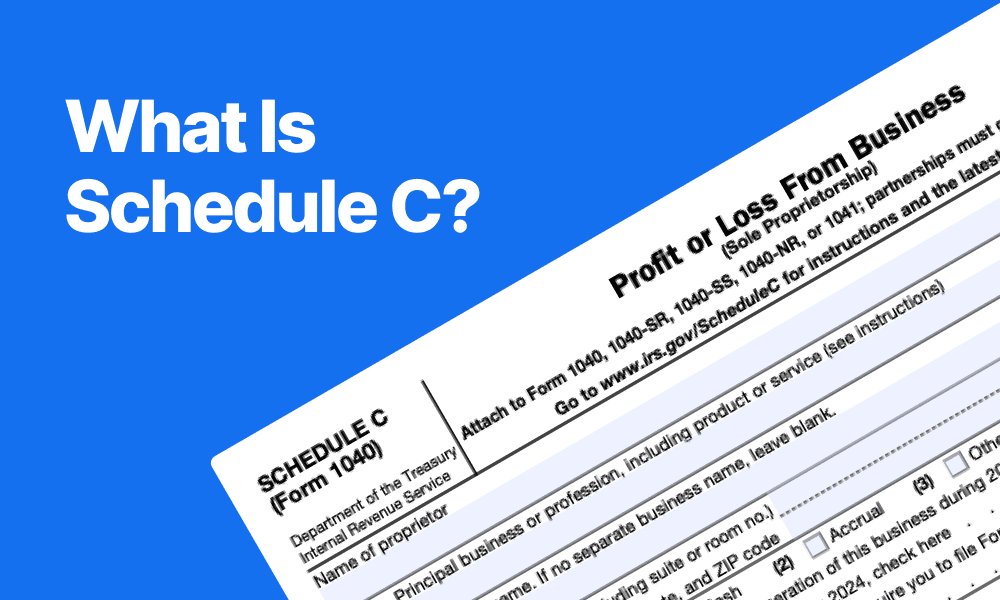What Is Schedule C? A Guide for Freelancers and Small Business Owners | TAXtical

What is IRS Schedule C? A Guide for Self-Employed and Small Business Owners
Running your own business? Whether you’re a freelancer, independent contractor, or operate a sole proprietorship, you’ll likely need to file Schedule C (Form 1040) with your tax return. This essential tax form helps the IRS determine how much profit your business made—and how much tax you owe (or how much you can deduct).
In this guide, TAXtical breaks down everything you need to know about Schedule C, including:
What it is
Who needs to file it
What types of income and expenses are reported
Common deductions
How TAXtical can help you simplify tax filing
What Is Schedule C (Form 1040)?
Schedule C, also known as Profit or Loss From Business, is an IRS tax form used by sole proprietors and self-employed individuals to report business income and expenses. It’s filed as part of your personal tax return (Form 1040) and helps determine your net business income or loss.
If your business is not incorporated and you operate under your own name or a trade name (DBA), this is the form you’ll likely use.
Who Should File Schedule C?
You should file Schedule C if you:
Operate as a sole proprietor
Work as a freelancer or gig worker (Uber driver, consultant, artist, etc.)
Are an independent contractor
Own a single-member LLC (unless you’ve elected to be taxed as a corporation)
Run a side hustle or part-time business that generates income
Even if your business didn’t make much profit—or ended the year with a loss—you still need to file Schedule C if you earned income.
What Income is Reported on Schedule C?
On Schedule C, you’ll report all income generated from your business activities, including:
Client payments (checks, PayPal, Venmo, bank transfers)
Cash receipts
1099-NEC income from contract work
Commissions and fees
Tips or bonuses
You should not include wages or salaries from a job as an employee—that income goes on your main Form 1040.
What Expenses Can Be Deducted?
One of the biggest benefits of using Schedule C is the ability to deduct legitimate business expenses, which reduces your taxable income. Common deductible expenses include:
Home office costs
Vehicle mileage or car expenses used for business
Office supplies & equipment
Software & subscriptions
Advertising & marketing
Business meals & travel
Legal & professional services
Internet and phone bills (portion used for business)
Health insurance (self-employed)
These deductions help lower your self-employment tax and federal income tax liability.
What Happens After You File Schedule C?
Once you calculate your net profit or loss, this amount is:
Transferred to Form 1040, affecting your total taxable income
Used to calculate self-employment tax on Schedule SE
Considered when determining your eligibility for certain tax credits or deductions
Common Mistakes to Avoid
Not filing Schedule C at all if you earned self-employed income
Mixing personal and business expenses
Not keeping accurate records or receipts
Forgetting to track mileage or home office use
Underreporting cash income
These mistakes can lead to penalties, audits, or missed tax savings.
Let TAXtical Help You Maximize Your Tax Savings
Navigating self-employment taxes can be overwhelming, but you don’t have to do it alone. At TAXtical, we help self-employed professionals and small business owners:
✅ Prepare and file Schedule C accurately
✅ Maximize legal deductions
✅ Minimize tax liability
✅ Stay compliant with IRS regulations
Don’t Overpay in Taxes — Get Expert Help
If you earned income from freelancing, contracting, or running your own business, Schedule C is a must. Let TAXtical handle the tax prep while you focus on growing your business.
📞 Contact TAXtical today for expert Schedule C filing and self-employed tax support!

